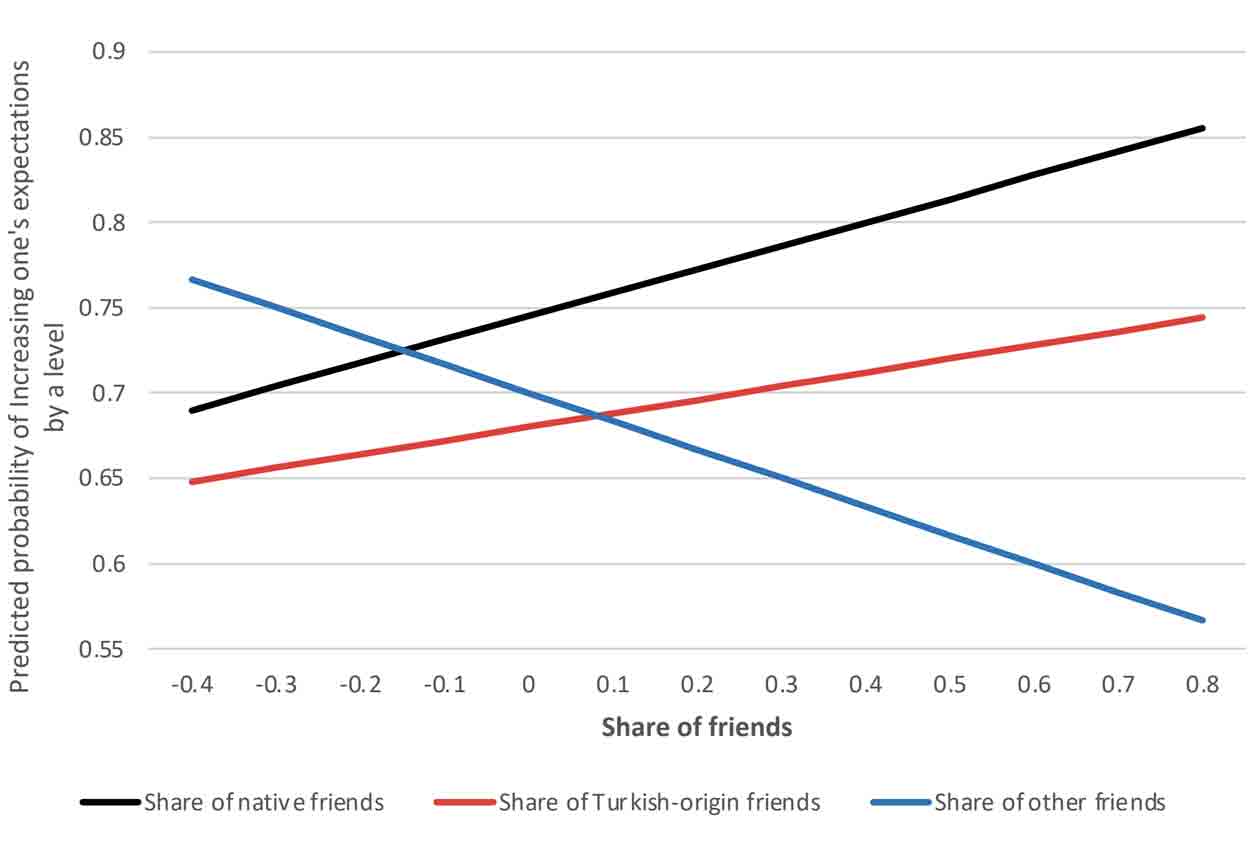Summary
We find pupils from various minority groups may benefit from friendships with majority-group members, particularly with those successful in the education system.
Mixed-ability, and mixed-ethnicity, classrooms are therefore a key component to promoting upward intergenerational mobility among the children of labour migrants.
About the study: social networks and educational expectations in Germany
We investigated how pupils of Turkish origin in Germany select their friends, and how these friends in turn influence their educational expectations (the qualifications pupils think they would realistically get in the future).
We looked at data on the friendship networks of 91 classrooms in German secondary schools, together with the educational expectations of pupils in these classrooms. Educational expectations are early indicators of actual educational qualifications. The possible educational expectations were, in line with the German school system, university as well as upper, intermediate, and lower secondary degrees.
Pupils were about 15 years old at the time of the first data collection. Data on both friendship and educational expectations were collected twice, with one year in-between, so it was possible to see how both changed over time.
This allowed us to investigate both how friendships influence expectations and how expectations influence friendships, over time. We analysed the data using both ordinal logistic regressions and specialised models for social network panel data.
What we already know about social networks and educational outcomes
Adolescents are highly susceptible to social influence; therefore, it matters who their school friends are. This is especially true for pupils with immigrant backgrounds; because their parents were born abroad, these pupils often have much less information about the education system and how to succeed than their native peers. Therefore, for pupils of immigrant background, befriending native peers may be an important tool for their intergenerational upward mobility.
Currently, we know little about the role of social relationships in the educational achievements of young people of immigrant background. Research shows that many educational outcomes (achievement, motivation, favourite subjects, specialisation choices) of adolescents are strongly influenced by their friends, but research has not typically investigated the possibility that different processes are involved for native pupils compared with those of immigrant background. The question therefore remains whether there are distinct influence processes for pupils of immigrant background, compared to natives, and whether pupils of immigrant background are influenced differently by their friends, depending on whether the background of those friends is native, same-immigrant group, or other-immigrant-group.
Another potential mechanism that links social ties to intergenerational mobility is the way in which pupils of immigrant background select their social ties. The influence of social ties can only enhance the educational success of pupils of immigrant background when these ties provide useful resources. In this sense, peers who are successful at school can be highly advantageous choices as friends. Although a few studies have investigated ethnic differences in academic-related characteristics of friends, the extent to which such differences translate into ethnic inequality in educational outcomes is still unknown.
Results: friendships with successful native peers make a difference
First, we looked at whether the share of same-ethnic friends (as opposed to the share of majority and other-minority friends) was associated with the development of Turkish- minority adolescents’ educational expectations.
Figure 1 shows that, as the proportion of Turkish-origin pupils’ majority friends rises, so do their educational expectations (see the black line in Figure 1). Similarly, the share of Turkish-origin friends is also associated with higher educational expectations, though less strongly (see the red line in Figure 1). A higher share of friends with ethnic backgrounds other than Turkish, however, seems detrimental (see the blue line in Figure 1). This is different for native pupils, who were found to only benefit from having other native friends, other ties being detrimental for their educational expectations.

We then looked at processes of selecting friends and the influence of friends on educational expectations over time.
The results show that Turkish-origin adolescents in Germany have distinct preferences for friends with high educational expectations, and this is true for both Turkish-origin friends and other friends. For native pupils, we do not find evidence that they prefer friends with higher educational expectations. In terms of the influence of friends, over time the expectations of pupils from all backgrounds converged towards the average expectations of their friends. Turkish-origin students were no more nor less susceptible to social influence of friends than their native peers or peers from other origin countries. However, the influence that friends have on the educational expectations of Turkish-origin students is not uniform: only majority-group friends exert a significant (positive) influence.
Conclusions
We draw two main conclusions from these results. First, Turkish-origin pupils tend to establish friendships with peers who are successful at school: this offers access to important resources and helps their educational attainment. Second, the influence of their friends varies depending on whether that influence comes from same-group friends, other minority- origin friends, or native friends.
Native peers seem to play a particularly important role in influencing Turkish-origin students. In line with various social theories, it appears that social ties to majority members provide nonredundant information that initiates changes in Turkish-minority adolescents’ educational expectations, potentially influencing them to aspire higher. In contrast, the educational expectations of fellow-Turkish friends were not associated with changes in Turkish adolescents’ own expectations.
These results suggest that pupils from various minority groups may indeed benefit from friendships with majority- group members, particularly with those successful in the education system, at least in some contexts. Mixed-ability, and mixed-ethnicity, classrooms are therefore a key component to promoting upward intergenerational mobility among the children of labour migrants.
The article is available at https://sociologicalscience.com/articles-v8-19-371.
© MiSoC June 2022
DOI: https://doi.org/10.5526/misoc-2022-002
